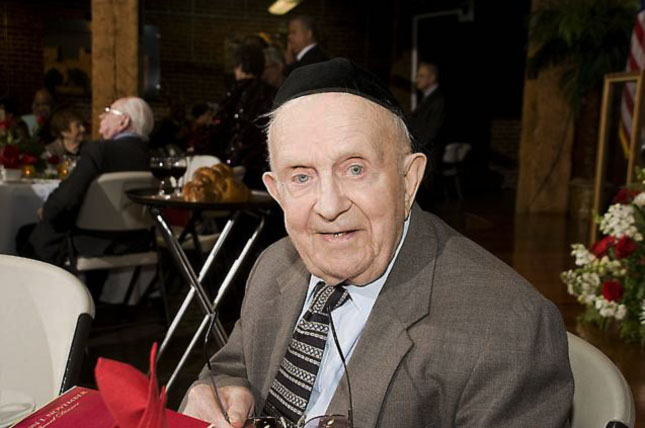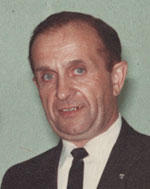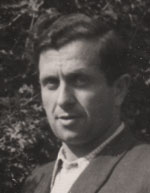Yesterday, the 17th of Iyar, was the shloshim of the ptirah of my mother’s baby brother – Henry Moss (Yechiel Leib ben Nochum, a”h) from Richmond, VA. He was niftar 6 months short of his 101st birthday. He had always said that all he wanted was to live to be a 100, his wish was certainly granted! He passed on the evening of March 28, at the onset of the second day of chol hamo’ed Pessach (18th of Nissan).
Henry Moss, a Holocaust survivor, left behind neither a wife nor children. I, his nephew, and my children and grandchildren are his only relatives left.

Yechiel Leib ben Nochum né Moszkowicz – Henry Moss, a”h
Photo courtesy of the Virginia Holocaust Museum.
Before WWII, he managed the family’s successful sweater factory in Lodz, Poland. Ten days before his wedding day, his intended was shot point blank by a Nazi murderer in front of his eyes. Since then, though popular, he never found another; no one ever measured up to the girl he had grown up with as neighbors in their native Stopnica. Always cheerful in company, he would have nightmares every night. He relived the scenes of the shooting, of the concentration camps, of the slave labor, of the beatings… He never got over what he lost, but through it all he showed a remarkable will to live, never allowing his spirit to break, never giving in to the murderers without. That was his revenge!
 Shortly before Hanukka 2006, as he was working in his bedroom, a heavy bookshelf somehow fell on him. For three days, he was under it, unable to move. When they finally found him he was rushed to the Medical College of Virginia Hospital. My sons and I came down as soon as we were contacted, we arrived at around 4:30am and immediately went to his hospital bed. He woke up shortly after, he saw us and smiled; against medical expectation he recovered enough after a couple of weeks where he could go to a rehab home. Before leaving they inserted a feeding tube, since he had lost the ability to swallow, he was told it was only a temporary measure but the doctor told me that he would need it for the rest of his life. The learned physician, who had had already performed over 15,000 such insertions, underestimated my uncle. Three months later the tube was removed, because Henry Moss loved life, and would not admit defeat!
Shortly before Hanukka 2006, as he was working in his bedroom, a heavy bookshelf somehow fell on him. For three days, he was under it, unable to move. When they finally found him he was rushed to the Medical College of Virginia Hospital. My sons and I came down as soon as we were contacted, we arrived at around 4:30am and immediately went to his hospital bed. He woke up shortly after, he saw us and smiled; against medical expectation he recovered enough after a couple of weeks where he could go to a rehab home. Before leaving they inserted a feeding tube, since he had lost the ability to swallow, he was told it was only a temporary measure but the doctor told me that he would need it for the rest of his life. The learned physician, who had had already performed over 15,000 such insertions, underestimated my uncle. Three months later the tube was removed, because Henry Moss loved life, and would not admit defeat!
The day before he left the hospital, one of his doctors called me outside of the room and said: “When he came in, he was unconscious, had suffered a minor heart attack, had not eaten for three days, was so swollen we had to cut his clothes off. We never expected him to survive.” My uncle, had obviously overheard and chimed in, “Come on doctor, the Nazis couldn’t finish me! You think a piece of wood would do the job?”
Since the ’60s he blew the shofar, at his congregation and – in his last years – at the assisted living home where he lived until a few months ago (when he switched to a new place). Last year, mere weeks before his hundredth birthday (although the Rabbi originally had misgivings because of his age), he did so again, leaving no one in attendance at the Rosh Hashana and Yom Kippur services, with a dry eye. I was told, his tekiyos managed to reach the deepest recesses of the heart, as everyone felt the sounds reverberate within them.
The Richmond Times Dispatch (April 2, 2013 issue) devoted a half page to uncle Henry, recounting some events he lived through during the WWII:
[…]He was 29 when Germany invaded Poland and the Nazis forced his family into the Lodz Ghetto.
[The day before the Nazis sealed the Lodz ghetto, he fled to Kielce with his brothers and parents, but without his sister and her husband, my parents] […] Eventually three-quarters of the ghetto residents, including most of his family, were shipped in cattle cars to Auschwitz, where they died. Only Mr. Moss and his twin brother, Mendel, remained.
Before the Kielce ghetto was liquidated, there was a selection. Mr. Moss told the Germans, “I am a mechanic!” and he was sent to Pionsky to make parts for guns. His brother was shipped to Auschwitz where he perished.
In Pionsky, where they needed bricklayers, Mr. Moss announced “”I am a bricklayer.” An SS man held a gun to his head as he attempted to lay bricks for the first time in his life. Although his work was very poor and the SS man saw it, the SS man told Mr. Moss “you are going to survive, you are a bricklayer.”
After the Pionsky Ghetto was liquidated, the “mechanic” walked to work in wooden shoes and helped build parts of airplanes near the Ratanoff Ghetto. About a year later, he was sent to Sachsenhausen-Oranienburg camp.
He recalled standing in all kinds of weather during the interminable morning head counts. He and his fellow prisoners were forced on several occasions top watch the Nazis hang prisoners who had tried to flee the camp.
He remembered that once , when three men who did not have shoes improvised pairs from the wood of their bunk beds, the Nazis forced the entire group of prisoners to stand barefoot in the snow for morning count for three days. Everyone’s feet froze, and Mr. Moss was hospitalized several time during his life because of his damaged feet and legs.
in 1945, when they knew the Russians were close and the SS had destroyed the watchtowers, Mr. Moss, who weighed only 80 pounds, and two friends commandeered three bikes from passing Germans. They somehow summoned the strength to ride into nearby American lines. “they gave us food, and we were liberated! God bless America!” he said in the interview.
Returning to Lodz after the war he went looking for family. He reunited with his sister Sophie [Zoshie, my mom..] in a displaced persons camp. He registered to go to America, Israel or Australia.
In 1950, he made his way by ship to New York, where a Jewish agency [HIAS] sent him to Richmond. He went to North Carolina to work at a sweater factory, but there was no kosher butcher and the only synagogue was not observant enough for him.
Mr. Moss returned to Richmond to board in a kosher home […] and to work at a 5-and-10 cent store […]. He eventually retired as top salesman for American Parts, an auto parts business.
His sister eventually moved to Israel. Mr. Moss recalled going twice to visit her and her husband’s graves – the only members of his family who had graves…
 When I was a child, growing up in Uruguay, I looked forward to my uncle Henry’s monthly packages filled with toys that became the envy of all my friends. Later, as I got older he would send clothes and books. Though we all dressed well, and far more formally than people do today, I always stood out from the crowd because of my Uncle Henry, because of “Tio,” as I called him (“uncle” in Spanish)
When I was a child, growing up in Uruguay, I looked forward to my uncle Henry’s monthly packages filled with toys that became the envy of all my friends. Later, as I got older he would send clothes and books. Though we all dressed well, and far more formally than people do today, I always stood out from the crowd because of my Uncle Henry, because of “Tio,” as I called him (“uncle” in Spanish)
My three sons and two daughters knew him since they were very little, he often visited us whether we lived in Israel, in Detroit, in Albany, or in Monsey (none of the weddings could go on until we all saw his blue eyes, his smiling face!). Many of my grandchildren were privileged to meet Uncle Henry, as well, and our whole clan – without exception – loved him dearly.
His levayah, which took place in Richmond, on the 31st of of March (20th of Nissan), was well attended in spite of the heavy, non-stop rainy weather. Well over 100 people of all ages, of all walks of life, of all ethnic backgrounds were there. Some were his friends for close to 60 years, some had only known him for a few months; there were those who provided him invaluable help in his last years, by taking him shopping, helping him write when his hands were barely responding and more; all had been touched by his caring, his humor, his zest for life!
Fetter, taierer, we all miss you!
CS
//

My mother is from Lodz born in 1923 and is a Holocaust survivor as well. My father was from Kielce. My mother’s uncle moved to Uruguay after the war. His last name is Kenig. I have been trying to connect to this family. My mother is still alive and we live in Los Angeles California.
Please reply, would love to see if we are related or if you know my mother’s family. My mother’s maiden name is Landowicz.
estelle marco
________________________________
LikeLike
I was born in Germany after the war. My parents hardly spoke about Kielce to me, but chances are that the families – if not related – at least knew each other. What was your dad’s last name? On my mother’s side (she’s the one from Kielce), the two families of grandparents were Abramowicz, and on her father’s side, Moszkowicz. Her maternal grandfather, was one of the last remaining Jewish counts in Poland. The family were given the title and castle a few generations earlier when they helped finance the Poniatowski family’s ascension to the Polish throne.
LikeLike
Dear Rabbi S.
BDE. Your Uncle Henry, A”H, sounds so special, and it is beautiful that he has such a loving nephew. Your article is very touching.
Chaya Rivka Z.
LikeLike
I have been looking for my mother’s uncle’s family that moved to Uruguay after the war. His last name was Kenig. His brother moved to England before the war. My mother is from Lodz and my father, A”H, was from Kielce. I wonder if you know of the family
LikeLike
I was grateful to work at Beth Sholom Gardens in 2010 – 2012, on weekends. I met your Uncle Henry Moss. He was a dear, dear man. I will always remember him. I loved caring for him as his Medication Aide/Certified Nurse Aide. His stories were fascinating.
LikeLike
Margaret, I’m honored that you found your way to my blog. Henry was indeed a very special person; his stories, his wisdom, will always stay etched in my heart…
LikeLiked by 1 person
Hi there, was your uncle an artist? A painter? I am searching the name “Yechiel Leib” because I have a painting that is signed with that name.
Could you possibly upload a photo of it to this site. Please?
LikeLike
Yes, he was.
LikeLike